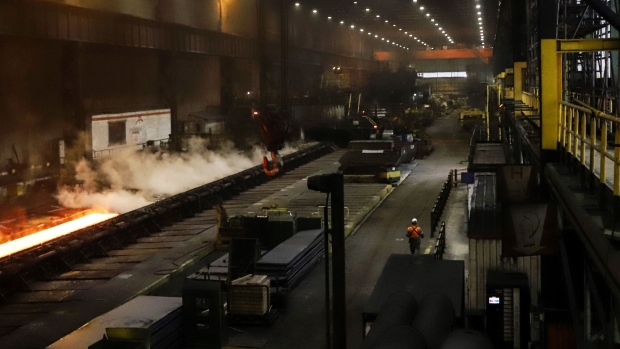ArcelorMittal Removes Russian Materials From Steel Supply Chain
, Bloomberg News
(Bloomberg) -- ArcelorMittal SA, Europe’s biggest steelmaker, has eliminated Russian commodities from its supply chain following the invasion of Ukraine.
Governments and companies across Europe are trying to curb their dependency on Russia, driving up prices of energy and commodities. The country has been a key supplier of iron ore and coal for the region’s blast furnaces and ArcelorMittal took three weeks to plan how to halt flows.
The steelmaker said it previously sourced about a fifth of the coal for its European mills from Russia. The company also bought iron ore from sanctioned billionaire Alisher Usmanov’s Metalloinvest, according to its annual report.
“We are independent now,” said Geert Van Poelvoorde, the steelmaker’s European chief executive officer, said in an interview from Ghent in Belgium. “For the third quarter, we need to buy a bit more from non-Russia. But this is not a big issue.”
The war in Ukraine will reshape global flows of raw materials, according to Van Poelvoorde. Within a few months, Russia will re-route exports of coal from Europe to China, which will in turn buy less of the fuel from Australia.
“Russians have always been very opportunistic,” Van Poelvoorde said. “There will be a world re-balancing.”
Steel prices have surged to fresh record in Europe after the European Union moved to curb Russia’s exports to the bloc. High energy prices have also forced some steel mills to curtail production, further hitting supply.
ArcelorMittal’s portfolio of iron ore and coal mines helped to ease the company’s pivot away from Russia, but other European steelmakers will find sourcing alternative supplies more challenging. About half of the coal consumed by Europe’s steel industry comes from Russia, according to Van Poelvoorde.
The European Union is discussing massive borrowing to finance energy projects that would help wean the bloc off its dependence on Russian gas. Decarbonization will increase the scale of the challenge, with the main path to net-zero steelmaking requiring large quantities of green hydrogen that can only be produced with vast amounts of renewable electricity.
Using hydrogen to decarbonize ArcelorMittal’s Ghent plant -- which produces 3.6% of the EU’s steel -- would require four gigawatts of power capacity, Van Poelvoorde said. That’s the equivalent to about a sixth of Belgium’s current total.
“The commission and the member states should be aware of the numbers, because I think they underestimate a bit what we’re talking about,” he said. “We need massive energy.”
©2022 Bloomberg L.P.
No comments:
Post a Comment